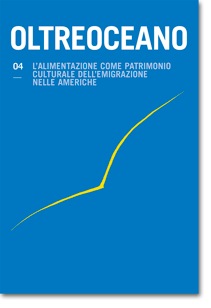Se il crogiuolo diventa un tegame
Keywords:
sapere culinario, meccanismi sociali, migrazione, molteplici tradizioniAbstract
Cercare nella letteratura attestazioni del sapere culinario di un popolo e di un’epoca consente di gettare uno sguardo sulla cultura che ha espresso, di penetrarne l’immaginario, di comprenderne meccanismi sociali, desideri ed aspettative. Lo studio indaga la vastità platense coniugata con le componenti migratorie – portatrici di frammentarietà regionale – dove sviluppa una cucina composita che difficilmente esprime piatti propri, ma che accoglie e rielabora le molteplici tradizioni in un riadattamento comune che oltrepassa i confini della collettività originaria.
If the Crucible Becomes a Pot
To find literary evidence regarding the culinary knowledge of a people and an era allows us to look at the culture it expressed, to peek its collective imagination, and to understand its social mechanisms, desires and expectations. This study investigates the wide Rio de la Plata region where various migratory components (which contribute to regional fragmentation) account for the development of a composite cuisine which rarely has its own typical dishes, but which incorporates and transforms multiple traditions into a common re-adaptation that supersedes the boundaries of the original collectivity.
Downloads
References
Amiano, D. (2009.08.23): Contar es una necesidad humana. La Nación. Recuperato da http://www.lanacion.com.ar/nota.asp?nota_id=1165742&origen=premium
Artusi, P. (2000): La scienza in cucina e l’arte di mangiar bene. Milano: Rizzoli.
Blengino, V. (2007): Ommi! L’America… Reggio Emilia: Diabasis.
Brillat-Savarin, A. (1985): Fisiologia del gusto ovvero meditazioni di gastronomia trascendente. Milano: Rizzoli.
Capatti, A & Montanari, M. (1999): La cucina italiana. Storia di una cultura. Bari: Laterza.
Discépolo, A. (1977): Babilonia. In J. Lafforgue & D. Viñas (Eds.), Teatro rioplatense, 1886-1930 (pp. 365-398). Caracas: Biblioteca Ayacucho.
Eco, U. (2009, 30 giugno): La realtà della finzione. Il vero e il falso in letteratura. La Repubblica, pp. 42-43.
Flacco, O. (2009): Orazio. Tutte le poesie. P. Fedeli (Ed.). C. Carena (Trad.). Torino: Einaudi.
Gambaro, G. (2001), El mar que nos trajo. Buenos Aires: Norma.
Gorriti, J. M. (1890): Cocina ecléctica, Recuperato da http://www.bibliotecasvirtuales.com/biblioteca/Librodecocina/RecetasdeJuanaManuelaGorriti/cocinaeclectica.asp
Grimod de La Reynière, A.-B. (1981): Almanacco dei buongustai. Milano: Serra e Riva.
Guigoni, A. (2009): Introduzione à la carte. In A. Guigoni (Ed.), Foodscapes. Stili mode e culture del cibo oggi (pp. 13-26). Monza: Polimetrica.
Magnus, A. (2007): Un chino en bicicleta. Buenos Aires: Norma.
Mansilla, L. V. (1904): Mis memorias. Recuperato da http://www.cervantesvirtual.com/servlet/SirveObras/00360552100025051869079/index.htm
Montanari, M. (1993): La fame e l’abbondanza. Storia dell’alimentazione in Europa. Bari: Laterza.
Montanari, M. (2009): Il riposo della polpetta e altre storie intorno al cibo. Bari: Laterza.
Onega, G. (1999): Cuando el tiempo era otro. Una historia de infancia en la pampa gringa. Buenos Aires: Mondadori.
Saer, J. J. (1988): El entenado. Barcelona: Destino.
Sarlo, B. (2007, 11 de febrero): Un equívoco spaghetti al uso nostro. Clarín. Recuperato da http://www.clarin.com/diario/2007/02/11/sociedad/s-01361448.htm
Scalabrini Ortiz, R. (1941): El hombre que está solo y espera. Buenos Aires: Riconquista.
Suez, P. (2000): Letargo. Norma: Buenos Aires.
Svampa, M. (2005): Los reinos perdidos. Buenos Aires: Sudamericana.
Vázquez Montalbán, M. (2005): Contro i gourmet. Milano: Frassinelli.
Vázquez Montalbán, M. (2005): Quinteto de Buenos Aires. Barcelona: Planeta.
Wilde, J. A. (1960): Buenos Aires desde 70 años atrás,1818-1880. Buenos Aires: Eudeba.
Downloads
Published
How to Cite
Issue
Section
License

This work is licensed under a Creative Commons Attribution-NonCommercial-ShareAlike 4.0 International License.
The authors undertake to comply with the following conditions, which are considered accepted at the time of submission of their contributions.
The sending of a text implies that it is unpublished and not submitted to be published elsewhere.
1. If accepted, the author shall confer on the publisher the right to publish and distribute it both in paper form and in the online electronic edition. The published articles will be downloadable and made available in open access.
2. Provided that it correctly indicates that the first publication took place in the journal Oltreoceano. Rivista sulle migrazioni the author has the right to: a) reproduce the article in separate extracts or collected in a volume; b) publish the article on their personal website or teaching site provided that these sites are of a non-commercial nature; c) deposit the article in online archives of a non-commercial nature, linked to the institution they belong to or as part of projects for the non-commercial dissemination and open access of scientific works.
The use of contributions by third parties, for commercial or otherwise unauthorized purposes, is not allowed. The publisher declines all responsibility for the unauthorized use of the material published in the journal.












